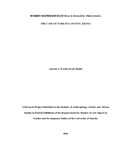| dc.description.abstract | The overall goal of this study was to investigate women‟s experiences in peace building within the County of Turkana. The study‟s specific objectives were to: document the role of women in peace building within the County of Turkana and; to determine the challenges faced by women in peace building in the County. The study was descriptive and employed qualitative data collection methods. Focus Group Discussions, case narratives and key informant interviews formed the main data collection methods. Study participants were purposively recruited from women groups within Turkana Central region who have participated in peace building processes at both formal and informal levels. Similarly, key informants and study participants for case narratives were purposively selected by virtue of their participation in peace building initiatives at both community and county levels.
As demonstrated by the findings of this study, women of Turkana County are still lagging behind their male counterparts in peace processes, particularly at the formal and decision making levels. It emerged that women have been socialized for peace building at the informal level where their role as peace builders is being recognized, but still lacks support. Further, the study revealed that women‟s participation in decision-making, peace building or community development in general, is tied to women‟s economic and social status. Culture was cited as overwhelmingly responsible for relegating women to a lower status to that of men.
Several recommendations are made to increase women‟s participation in peace building processes within the county. They include: raising literacy rates amongst women and girls; advocacy and awareness-raising on the need for inclusive peace processes; empowering women economically; promote general development of Arid-lands in Kenya and male involvement in gender issues.
The findings of this study will provide insights for future research on the role of women in pastoral communities in all aspects of peace processes. The study should assist in assessing Kenya‟s adoption of UNSCR, particularly in ensuring a gendered approach in the establishment, coordination and monitoring of various committees and networks in the security sector at both County and Sub-County levels. | en_US |



